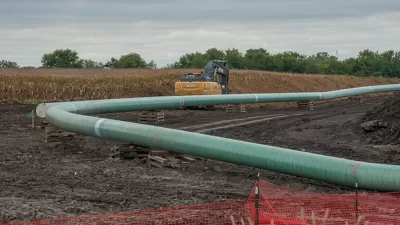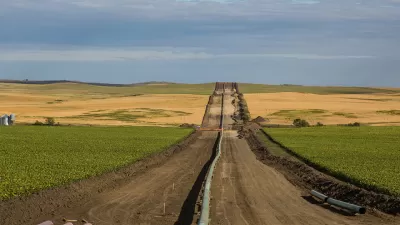TransCanada, developer of the controversial 1,179-mile pipeline that would transport crude derived from oils sands in Alberta to Steele City, Nebraska, asked the State Department to hold-off processing its application for the seven-year-old project.
Spokesman Mark Cooper said TransCanada was not withdrawing its application. Instead, he said, “We are asking the State Department to suspend a decision.”
UPDATE: Request likely to be rebuffed; see response below from White House.
While their press release states that the purpose of the suspension was based on its application to the "Nebraska Public Service Commission for approval of its preferred route in the state," speculation is that the real purpose is political, more specifically, the politics of the U.S. presidential election.
The move by TransCanada appeared to confirm speculation that the company hopes to push off a decision until the next administration because it fears Obama will reject the pipeline. Hours before TransCanada announced its request, the White House said it expected Obama to make a decision about the pipeline “before the end of his administration,” though it did not specify when.
That said, TransCanada Corp. is having difficulty in Nebraska due to objections by landowners who are fighting the company's use of eminent domain, though "a split decision by the Nebraska Supreme Court removes a key objection," as noted here in January.
If President Obama was to deny the application, as many suspect he will, TransCanada would have to start a new application process. Obama's last action on Keystone was to veto a bipartisan bill that "passed on a 270 to 152 vote in the House, twenty short of the 290 needed to override a presidential veto," according to a February post on Planetizen.
If a Republican wins the White House next November, the application would be reactivated, goes the theory.
UPDATE, Nov. 3, 4:36 PM EST:
"White House officials said Tuesday the president intends to decide the fate of the Keystone XL pipeline during his tenure, rather than suspend the federal review process at the request of the project’s sponsor," writes Juliet Eilperin of The Washington Post.
The southern portion of the pipeline, from Steele City to the Gulf Coast, has already been approved and is in operation.
FULL STORY: New twist in Keystone controversy: Pipeline owner TransCanada asks for a delay

Planetizen Federal Action Tracker
A weekly monitor of how Trump’s orders and actions are impacting planners and planning in America.

Chicago’s Ghost Rails
Just beneath the surface of the modern city lie the remnants of its expansive early 20th-century streetcar system.

San Antonio and Austin are Fusing Into one Massive Megaregion
The region spanning the two central Texas cities is growing fast, posing challenges for local infrastructure and water supplies.

Since Zion's Shuttles Went Electric “The Smog is Gone”
Visitors to Zion National Park can enjoy the canyon via the nation’s first fully electric park shuttle system.

Trump Distributing DOT Safety Funds at 1/10 Rate of Biden
Funds for Safe Streets and other transportation safety and equity programs are being held up by administrative reviews and conflicts with the Trump administration’s priorities.

German Cities Subsidize Taxis for Women Amid Wave of Violence
Free or low-cost taxi rides can help women navigate cities more safely, but critics say the programs don't address the root causes of violence against women.
Urban Design for Planners 1: Software Tools
This six-course series explores essential urban design concepts using open source software and equips planners with the tools they need to participate fully in the urban design process.
Planning for Universal Design
Learn the tools for implementing Universal Design in planning regulations.
planning NEXT
Appalachian Highlands Housing Partners
Mpact (founded as Rail~Volution)
City of Camden Redevelopment Agency
City of Astoria
City of Portland
City of Laramie




























